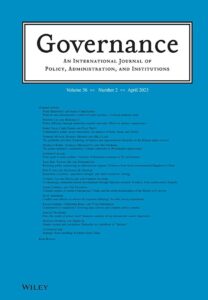
Changdong Zhang and Bruce Dickson
Governance: An International Journal of Policy, Administration, and Institutions
Abstract: Public finance lies at the heart of politics. It shapes citizens’ political attitudes and behaviors. While the expenditure side has been studied very extensively, the income side has been neglected, especially in authoritarian regimes. Taking China as an ideal case, we use a nation-wide random sample of urban residents to study how citizens under strong authoritarian states perceive their tax burdens. We find that Chinese citizens have low tax consciousness, defined as the perception of fairness both in comparison to people they know and to the amount of public goods they receive. Citizens’ income, the amount of public goods they receive, and media consumption have important effects on their tax perception. We argue that there are three mechanisms used by China’s “half-tax state” to reduce their citizens’ tax perception: (1) reduce the salience of people’s tax burden, conditional on their income level, (2) generate fiscal illusion effects while providing public services in return for taxes paid, and (3) use propaganda to shape the ideology of tax compliance.
About the author: Changdong Zhang is a HYI Visiting Scholar from 2022-23.
